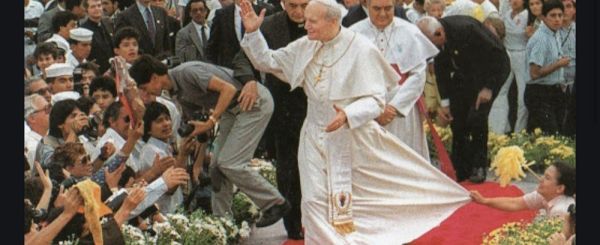2. Jesus says: "The kingdom of heaven is like a king who made a wedding feast for his son" (Matthew 22: 2). The parable of the wedding feast presents the Kingdom of God as a royal - and therefore sovereign - initiative of God himself. It also includes the theme of love, and precisely of spousal love: the son for whom the father prepares the wedding feast is the bridegroom.
Although the bride is not called by name in this parable, the circumstances indicate her presence, and make it clear who she is. This will appear clearly in other New Testament texts, which identify the Church with the Bride (Jn 3:29; Rev 21:9; 2 Cor 11:2; Eph 5:23-27.29).
3. On the other hand, the parable clearly contains the indication of the Bridegroom, who is Christ, who implements the Father's new Covenant with humanity. This is a covenant of love, and the Kingdom of God itself appears as a communion (community of love), which the Son implements by the Father's will. The 'banquet' is the expression of this communion. In the context of the economy of salvation described by the Gospel, it is not difficult to see in this nuptial banquet a reference to the Eucharist: the sacrament of the new and eternal Covenant, the sacrament of Christ's nuptial wedding with humanity in the Church.
4. Although the Church as Bride is not mentioned in the parable, other elements are found in the context of the parable that recall what the Gospel tells us about the Church as the Kingdom of God. Thus the universality of the divine invitation: "The King says to his servants, 'Everyone you find, call them to the wedding'" (Matthew 22:9).
Among the guests at the wedding banquet of the Son, those chosen first are missing: those who were to be guests according to the tradition of the old Covenant. These refuse to go to the banquet of the new Covenant, citing various pretexts. Then Jesus makes the King, the master of the house, say: "Many are called, but few chosen" (Mt 22:14). Instead, the invitation is extended to many others, who crowd the banquet hall. The detail brings to mind that other cautionary word that Jesus had spoken: "Now I tell you that many will come from the east and the west and will sit at table with Abraham, Isaac and Jacob in the kingdom of heaven, while the children of the kingdom will be cast out" (Mt 8:11-12). Here we can clearly see how the invitation becomes universal: God intends to make the new Covenant in his Son no longer with the chosen people alone, but with the whole of humanity.
5. The sequel to the parable indicates that definitive participation in the wedding banquet is linked to certain essential conditions. It is not enough to have entered the Church to be sure of eternal salvation: "Friend, how could you enter here without a wedding garment?" (Matthew 22:12), the King asks one of the guests. The parable, which at this point seems to move from the problem of the historical rejection of the election by the people of Israel to the individual behaviour of whoever is called and the judgement that will be pronounced on him, does not specify the meaning of that 'garment'. But it can be said that the explanation is to be found in the whole of Christ's teaching. The Gospel, particularly the Sermon on the Mount, speaks of the commandment of love, which is the principle of divine life and perfection after the pattern of the Father: 'Be . . . perfect as your heavenly Father is perfect' (Mt 5:48). This is that 'new commandment', which, as Jesus teaches, consists in this: 'As I have loved you, so love one another' (Jn 13:34). It thus seems to be concluded that the "wedding garment", as a condition for attending the banquet, is precisely this love.
This is confirmed by another great parable, concerning the final judgement, and therefore of an eschatological nature. Only those who implement the commandment of love in works of spiritual and corporal mercy towards their neighbour can take part in the banquet of the Kingdom of God: "Come, ye blessed of my Father, inherit the kingdom prepared for you from the foundation of the world" (Mt 25:34).
[Pope John Paul II, General Audience 18 September 1991]












